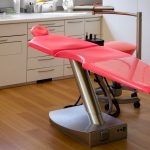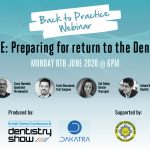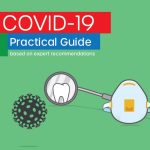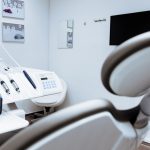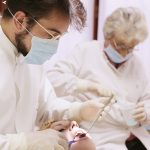BDA Chair Mick Armstrong explains why dentists opening from today (8 June) in England will not be ‘business as usual’ and calls for more support for dentists and their teams, to help get them back to work and treating patients in need, in this statement released:
I think we are all still recovering from the bombshell on that dentists would be able to open their doors to patients on 28 May, many of you read the news via the ticker tape on the BBC. This was nothing short of ‘disrespectful to the profession’ as my colleagues have pointed out numerous times on national TV and radio.
We knew that colleagues wanted to get back safely and effectively, for themselves, their staff and their patients. But the Government, once again, ignored what dentists had to say and implied to the public that dentists would all be opening and ready from 8 June.
We know that this will not be the case for many, here’s 5 things you need to know:
1. Managing patient expectations: a mountain to climb
This is not a return to ‘business as usual’. I know many of you will have had your phones ringing off the hooks. Colleagues have said to me they’ve had patients shouting down the phone to them, unable to understand why they can’t get an appointment next week.
Whilst we’ve said we are relieved to be able to get back to work, we weren’t given any notice, and we haven’t been given the right support from Government to help us get back to seeing our patients. We’ve been working hard to get dentist’s stories out in the local and national media, putting this announcement that first appeared on a BBC ticker and Matt Hancock’s ‘thanking’ us into some context.
Our spokespeople have been highlighting why huge numbers of patients can’t be seen – the backlogs, the lack of PPE, making changes to practice facilities to enable social distancing, the need for extended time between patients to decontaminate, the problems with getting staff back to work who’ve been redeployed or furloughed, and the issues for many staff in getting childcare, or who vulnerable and/or need to shield.
We’ve demanded clarity for dentists and their team members having ‘key worker’ status so they can access childcare if needed. We’ve been outlining what patients will experience when we do get back to work and when they do make it through our doors, so their expectations can be in line with our ability to treat them.
2. Shrinking stocks of PPE and rising costs
We’ve been saying since this crisis started that getting hold of the right PPE is one of our major issues. In the early days of the pandemic we asked dentists to donate their stocks to frontline hospitals, ICUs, GPs, pharmacies and care homes, and many of you generously did. This helped to keep many of our healthcare colleagues safe and prevent the spread to their patients. But this has left dentists without access to existing supplies with the price of even basic face masks jumping from pennies to pounds.
We’ve called on NHS England to include dentists in the supply chain, which they have now promised, but we know even some UDC centres are struggling with supplies. Industry sources estimate that the need for new kit and the pressure on the supply chain means PPE costs per patient will increase by 700% for non-AGP activity and around 6,000% for AGP, compared to pre-pandemic costs.
Our survey showed that less than one in five practices will be able to offer a full range of treatments, especially those that require AGP (which represents the overwhelming majority of modern dentistry), mainly because of a lack of kit. And we continue to hear some horrifying stories of Victorian and DIY dentistry that patients who are so desperate to get out of pain, are feeling the need to resort to because they can’t get to see a dentist. This cannot continue.
3. Ongoing financial support will be needed
For both NHS and private practices, we know that fewer patients and increased costs mean many of you are facing financial meltdown and closure – we’ve had some support, but if the Government pulls the plug on this, many contract holders may just walk away. The numbers simply won’t add up.
For private practices, we’ve been campaigning to ask for financial help, as most couldn’t access any of the Government support on offer, couldn’t get relief from business rates, and even those that are able to get back to work, we know the books will still be harder to balance. Without private care, NHS dentistry will be gridlocked, as patients will struggle to find anyone able to help them.
These problems have long term consequences for patients and the profession. England already had access problems, but now with these added challenges, we are likely to only be able to see a fraction of patients, as the queues get longer and longer.
4. Weathering this emotional rollercoaster: support for dentists’ wellbeing
I think physically and emotionally, a lot of dentists and their teams are in a very difficult place at the moment. I feel we are really now at rock bottom and I want to acknowledge that, in spite of the many who may be managing to ‘carry on’ and ‘make it work’, many more are faltering under the pressure.
What feels like endless last-minute missives from the Government, our regulators, and commissioners, confusing guidance, pages of documents to read, scared colleagues and team members, angry patients, making the finances add up – we are facing a perfect storm.
If you are struggling, please don’t feel you are alone, there is support out there – BDA members can access Health Assured, or you can try the Practitioner Advice and Support Scheme (PASS) via your Local Dental Committee. Dentists can also access the NHS Practitioner Support Programme, Dentists’ Health Support Trust, and ConfiDental. If you urgently need support, the Samaritans are willing to listen, at any time of day or night.
5. Together we are stronger
We’ve set out our case to government in an open letter to Matt Hancock. Lobbying is a key part of what we do. But throughout this crisis, we have been pulling our resources together to provide everything we can for our members. Our advice, services, toolkits and webinars have been designed solely to help support you through this crisis.
We’ve tried to keep you regularly updated and we will continue to do that, but we need your support too. We understand that dentists have been squeezed financially, and BDA membership might feel like a ‘dispensable’ cost. I would strongly urge you to remember that it isn’t – we can only continue to do what we do with the support of our membership. We can get through this, but only if we stand together.
Mick Armstrong, Chair
BDA Board




